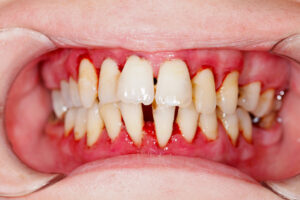Gum disease goes by a lot of names, and the proper name depends on what stage of gum disease you’re in.
Get ahold of us to be treated by a periodontal dentist in Mesa AZ.
Here’s what you need to know about gum disease and how it progresses.
Stages of Gum Disease

Early gum disease is called gingivitis. This is when your gum tissue becomes inflamed. It’s usually the first stage of gum disease, and it’s reversible.
If you don’t treat gingivitis, it can progress to periodontitis. This is when your gum tissue starts to pull away from your teeth.
Plaque can then get under your gum tissue and cause even more inflammation. This can eventually lead to bone loss and tooth loss.
All stages of gum disease are part of what is also called “periodontal disease”. The only 2 stages are gingivitis (curable) and periodontitis (incurable, but manageable).
Untreated Gingivitis Becomes Periodontitis

If you don’t treat gingivitis, it will progress to periodontitis. This is the second stage of gum disease.
At this stage, your gum tissue starts to recede (pull away) from your teeth. You might notice that your gums look red and puffy, and you might have bad breath.
Your teeth might become loose, and eventually you could lose them.
To prevent gum disease from progressing to this point, it’s important to see a dentist in Mesa regularly and brush and floss your teeth every day.
If you have any concerns about gum disease, please consult your dentist.
Symptoms of Gingivitis and Periodontitis

The symptoms of gum disease progress as the condition gets worse. In its early stages, gingivitis usually doesn’t cause any pain.
As gum disease progresses to periodontitis, you might experience the following symptoms:
- Gums that look red and puffy
- Bad breath
- Gums that bleed easily
- Pain when chewing
- Loose teeth
- Sensitive teeth
At-Home Treatment For Gingivitis

There are home remedies for gingivitis, and your dentist will likely recommend that you brush and floss more frequently. You might also need to use an antibacterial mouthwash or a prescription medication.
Dental Office Treatment For Gingivitis & Periodontitis

If your gum disease is more severe, you might need to get a dental cleaning. This involves numbing your gums and teeth and then using special instruments to remove plaque and tartar from below the gumline.
You might also need to take antibiotics or get a procedure called root planing, which involves smoothing out the roots of your teeth so that bacteria can’t attach as easily.
In severe cases of gum disease, you might need surgery to restore the gum tissue. This can involve grafting tissue from another part of your mouth or using artificial gum tissue.
Conclusion
Gum disease is a serious condition that can lead to tooth loss, bone loss and other oral health problems. If you think you might have gum disease, see your dentist as soon as possible for an evaluation. Gum disease can also lead to serious health problems, such as stroke and heart disease. Treating gum disease early can help prevent it from becoming more severe.

